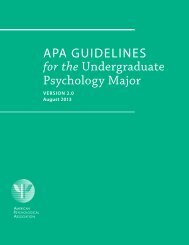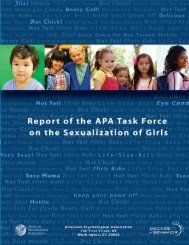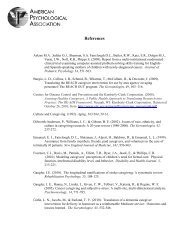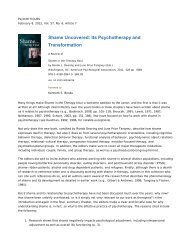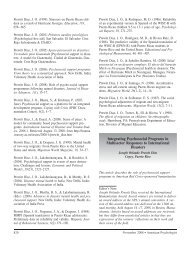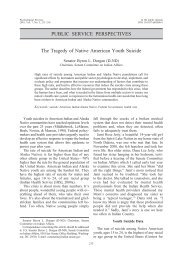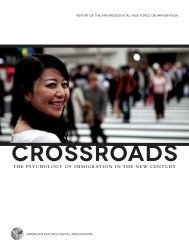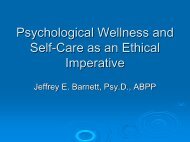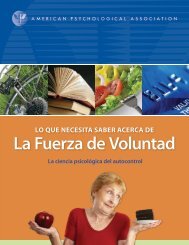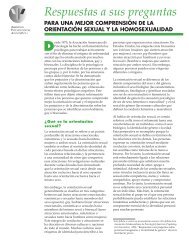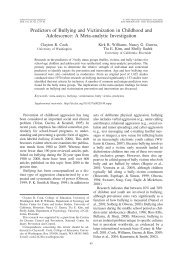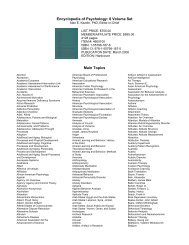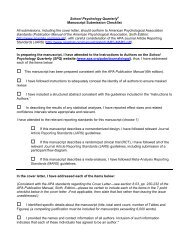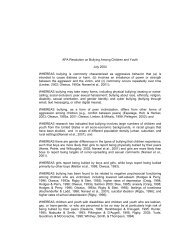Willpower, Poverty and Financial Decision-Making - American ...
Willpower, Poverty and Financial Decision-Making - American ...
Willpower, Poverty and Financial Decision-Making - American ...
You also want an ePaper? Increase the reach of your titles
YUMPU automatically turns print PDFs into web optimized ePapers that Google loves.
<strong>Willpower</strong>, <strong>Poverty</strong> <strong>and</strong> <strong>Financial</strong><br />
<strong>Decision</strong>-<strong>Making</strong><br />
Whether you’re lured by new shoes or a new car, the temptation to buy is a<br />
familiar test of will. Just as unhealthy food choices have become ubiquitous, so<br />
too have opportunities for impulse spending. ATMs are everywhere, <strong>and</strong> online<br />
shopping means you can burn through your savings without ever leaving the<br />
couch. And, as in other areas of life, from overeating to resisting alcohol, people’s<br />
purchasing behavior has been shown to be subject to willpower depletion.<br />
Kathleen Vohs <strong>and</strong> Ronald Faber, a professor of mass communication at the<br />
University of Minnesota, studied willpower depletion <strong>and</strong> impulse buying. They<br />
showed volunteers a silent film clip in which a series of common one-syllable<br />
words appeared across the bottom of the screen. Some of the participants were<br />
instructed to actively ignore the words, a task known to require self-control.<br />
Afterward, participants paged through product listings for objects such as<br />
watches <strong>and</strong> cars <strong>and</strong> then reported how much they’d be willing to pay for<br />
each item. Subjects who had exerted self-control in the video task were willing<br />
to spend considerably more — $30,037, on average, versus $22,789 — than<br />
participants whose self-control hadn’t been run down.<br />
In a second experiment, Vohs <strong>and</strong> Faber tested subjects’ actual spending<br />
behavior by presenting them with an opportunity to purchase low-cost items<br />
such as mugs <strong>and</strong> playing cards. Those who had previously exerted self-control<br />
in a lab exercise reported experiencing more temptation to buy. And in fact,<br />
they purchased a larger number of items <strong>and</strong> spent a greater amount of money<br />
than did participants who hadn’t performed the willpower-draining task.<br />
<strong>Financial</strong> decision-making may be even more challenging for people living<br />
in poverty. Princeton University doctoral c<strong>and</strong>idate Dean Spears conducted<br />
a series of experiments in rural India to explore the link between willpower<br />
strength <strong>and</strong> poverty. In one, he visited two villages of different financial<br />
st<strong>and</strong>ing <strong>and</strong> offered people a chance to purchase a popular br<strong>and</strong> of body<br />
soap at a significantly discounted price. The soap was a good deal, but it still<br />
represented a difficult financial choice for individuals living in poverty.<br />
Before <strong>and</strong> after the soap was offered, the participants were asked to squeeze<br />
an exercise h<strong>and</strong>grip, a common test of self-control strength. Spears found that<br />
<strong>Willpower</strong>, <strong>Poverty</strong> <strong>and</strong> <strong>Financial</strong> <strong>Decision</strong>-<strong>Making</strong><br />
Just as unhealthy food choices have<br />
become ubiquitous, so too have<br />
opportunities for impulse spending.<br />
11
12<br />
What You Need to Know about <strong>Willpower</strong>: The Psychological Science of Self-Control<br />
Eliminating the decision<br />
of whether to spend or save<br />
helped customers avoid<br />
willpower failure.<br />
FURTHER READING<br />
Ashraf, N., et al. (2006). Tying Odysseus<br />
to the mast: Evidence from a<br />
commitment savings product in the<br />
Philippines. The Quarterly Journal of<br />
Economics, 121, 635–672.<br />
Baumeister, R., et al. (2007). Free will<br />
in consumer behavior: Self-control,<br />
ego depletion, <strong>and</strong> choice. Journal of<br />
Consumer Psychology, 18(1), 4–13.<br />
Spears, D. (2010). Economic decisionmaking<br />
in poverty depletes behavioral<br />
control (Working Paper No. 213).<br />
Center for Economic Policy Studies,<br />
Princeton University. Retrieved from<br />
http://www.princeton.edu/ceps/<br />
workingpapers/213spears.pdf<br />
Vohs, K., Baumeister, R., & Tice,<br />
D. (2006). Self-regulation: Goals,<br />
consumption, <strong>and</strong> choices. In C. P.<br />
Haugtvedt, P. Herr, & F. Kardes (Eds.),<br />
H<strong>and</strong>book of Consumer Psychology.<br />
Vohs, K., & Faber, R. (2007). Spent<br />
resources: Self-regulatory availability<br />
affects impulse buying. Journal of<br />
Consumer Research, 33(4), 537–547.<br />
richer participants squeezed the h<strong>and</strong>grip for about the same length of time<br />
before <strong>and</strong> after the soap-purchasing opportunity. Poorer participants, though,<br />
squeezed for a significantly shorter duration the second time around. Their<br />
willpower strength, he concluded, had been run down by their difficult financial<br />
decision-making.<br />
In another study, Spears turned his attention to a cross-section of <strong>American</strong><br />
shoppers. All shoppers, rich <strong>and</strong> poor, engage in economic decision-making.<br />
But financial decisions that are quick <strong>and</strong> easy for richer shoppers are likely<br />
to represent difficult tests of self-control among people who are financially<br />
insecure. Therefore, poorer shoppers, Spears reasoned, would likely experience<br />
a greater depletion of their willpower as they faced repeated, difficult financial<br />
decisions. And in fact, he found that poorer individuals were considerably<br />
more likely to consume food <strong>and</strong> drink while shopping than were richer<br />
individuals — an indicator that financial decision-making had run down their<br />
self-control stockpiles.<br />
There is a silver lining to this research. If people in poverty are more prone to<br />
willpower depletion, then perhaps reducing the number of difficult decisions<br />
they must make can help to maintain their stores of self-control for future<br />
decisions. Harvard Business School economist Nava Ashraf, PhD, <strong>and</strong> colleagues<br />
demonstrated that effect among bank customers in the Philippines. They<br />
offered the customers a chance to open individual savings accounts, with a<br />
catch: The customers could withdraw their funds only after they’d reached a<br />
target date or target savings amount that they themselves had chosen. After<br />
a year, participants who enrolled in the accounts saved 82 percent more than<br />
customers in a control group who had not opened the special accounts.<br />
Eliminating the decision of whether to spend or save helped customers avoid<br />
willpower failure.<br />
Together these findings suggest that people at the low end of the<br />
socioeconomic spectrum may be particularly vulnerable to a breakdown of<br />
their willpower resources. It’s not that the poor have less willpower than the<br />
rich, rather, for people living in poverty, every decision — even whether to buy<br />
soap — requires self-control <strong>and</strong> dips into their limited willpower pool.



